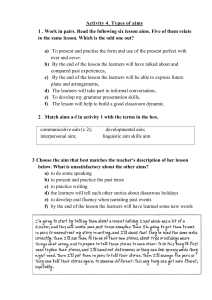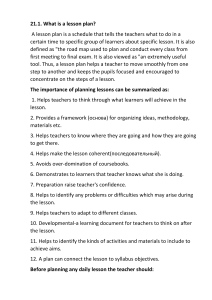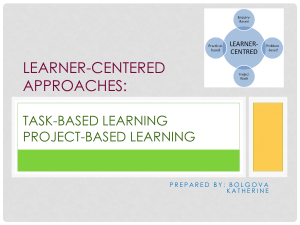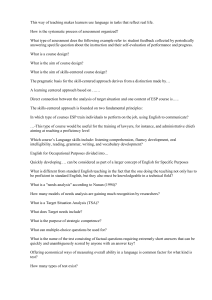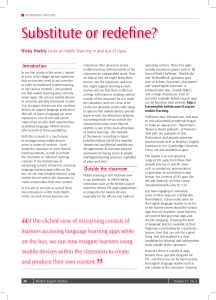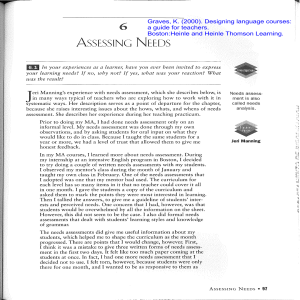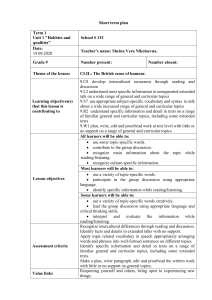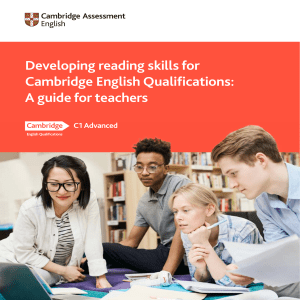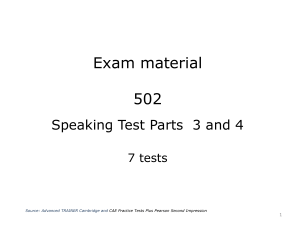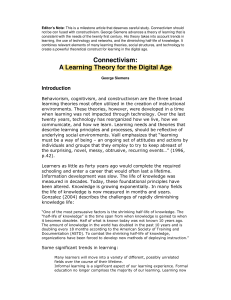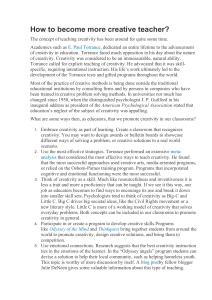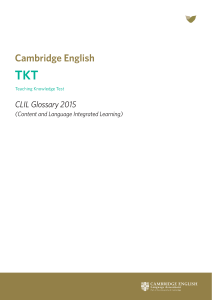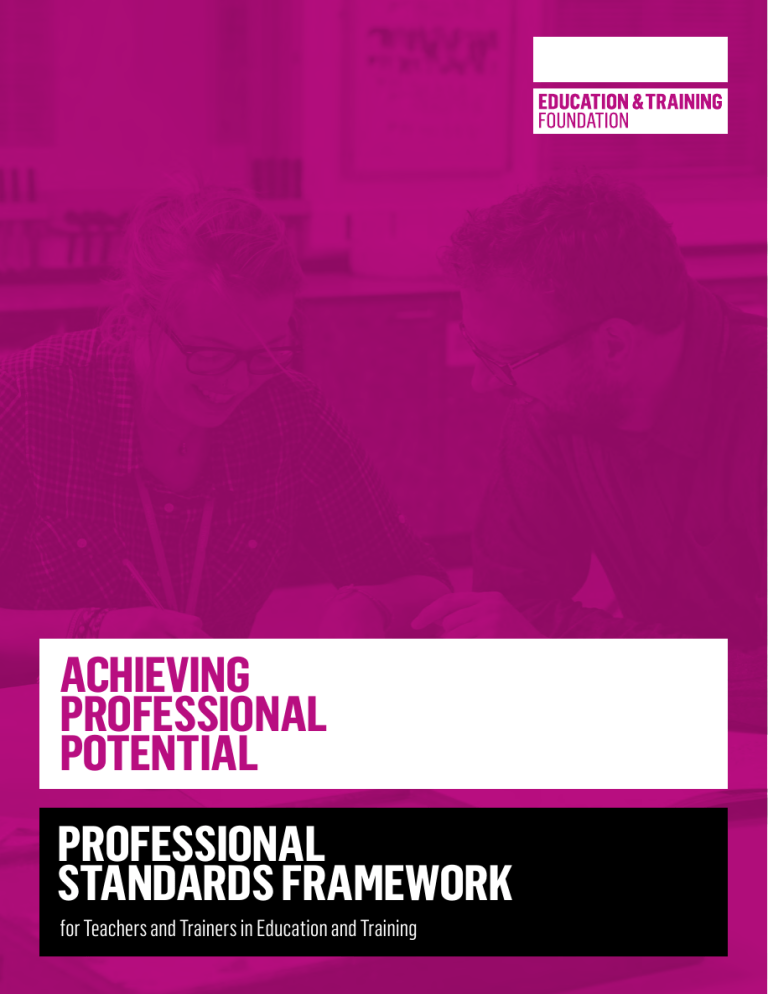
ACHIEVING PROFESSIONAL POTENTIAL PROFESSIONAL STANDARDS FRAMEWORK for Teachers and Trainers in Education and Training INTRODUCTION The Standards are helping drive culture change within the sector, focus initial teacher education and continuous professional development, and provide a holistic view of what makes a professional educator in our sector. Organisations and individuals can interpret the Standards for themselves, but to facilitate a common language of longer term professional development we have created this framework. Presented as a grid that captures possible stages of career progression for each of the twenty Standards for Teachers and Trainers, it is based on robust educational research and observed effective practice across all parts of our sector. They contain no reference to achievement of qualification, nor set out detailed guidance on how to evidence what is recommended. Instead they provide an interpretation of what a professional might be doing at differing stages of their career or training, seen through the ‘lens’ of the Standards. 01 Please see the guidance on transitions between the stages to best understand how a teacher may progress from stage to stage. You should not expect yourself or your staff to necessarily meet all the Standards at the same level, and a ‘spiky profile’ is normal. It is also essential to remember that to develop from stage to stage of this framework will take reflection and mastery of different skills over your career, and there is no recommended time that a teacher may be at any one stage. There are a range of tools and guidance to support you in using the Standards available from both the ETF and the Society for Education and Training (SET) websites. Pro f & u es Profession & attri al va but l e ues s The Professional Standards are set across three sections each of equal importance: each links to and supports the other sections. THE PROFESSIONAL STANDARDS Professional skills dg knowle e nal nding sio dersta n The Professional Standards for Teachers and Trainers have become an essential tool in informing and supporting teachers’ and trainers’ continuing professional development. The Education and Training Foundation (ETF) has created this differentiated structure to provide common language for understanding and communicating their career progression. PROFESSIONAL VALUES AND ATTRIBUTES Develop your own judgement of what works and does not work in your teaching and training. 02­—03 PROFESSIONAL VALUES AND ATTRIBUTES 2014 Professional Standards 01 02 03 * 04—05 A* The developing teacher/trainer Stage 1 B* The professional teacher/trainer Stage 2 C* The advanced teacher/trainer Stage 3 Reflect on what works best in your teaching and learning to meet the diverse needs of learners I reflect on my teaching, evaluate its impact on my different learners and identify aspects of my teaching that work well and those that need developing to meet the diverse needs of learners. I systematically reflect on my teaching, evaluate its effectiveness in meeting the diverse needs of learners and plan appropriate actions that will meet those needs. I systematically engage in critical, learner-focused reflection to set myself challenging professional targets designed to meet the diverse needs of all learners in multiple settings. Evaluate and challenge your practice, values and beliefs I evaluate my own practice, values and beliefs in education and training and show an awareness of alternative positions. I evaluate and challenge my own practice, values and beliefs in education and training and explore how alternative positions might influence them in a range of settings. I reflect critically and systematically on my own practice, values and beliefs and how they might impact on learners. I explore how alternative positions might challenge mine and evaluate their implications for teaching and learning in a range of settings. Inspire, motivate and raise aspirations of learners through your enthusiasm and knowledge I use key concepts of motivation and demonstrate an evident enthusiasm in the teaching of my subject and/or in my teaching context. I inspire and communicate my enthusiasm for learning to my learners and can effectively motivate them in the teaching of my subject/vocational area. I consistently achieve high levels of engagement and motivation with my learners and maintain high expectations of my learners in the teaching of my subject/ vocational area. For guidance on A, B and C please see Transition Stages (pages 22–23) PROFESSIONAL VALUES AND ATTRIBUTES 2014 Professional Standards 04 05 06 06—07 A The developing teacher/trainer Stage 1 B The professional teacher/trainer Stage 2 C The advanced teacher/trainer Stage 3 Be creative and innovative in selecting and adapting strategies to help learners to learn I use established strategies and some new approaches for teaching and assessment in my specialist area confidently and competently. I develop innovative and creative approaches to improve teaching and learning and/or assessment in my specialist area, including some risk-taking where appropriate. I consistently develop innovative and creative approaches, often in a spontaneous and flexible way, to improve teaching, learning and/or assessment, including experimentation and risk-taking where appropriate. Value and promote social and cultural diversity, equality of opportunity and inclusion I demonstrate an understanding of social and cultural diversity, equality of opportunity and inclusion and apply this to my teaching. I successfully model social and cultural diversity, equality of opportunity and inclusion in all of my practice and I encourage my learners’ awareness of diversity and inclusion issues. I respect and encourage all learners’ understanding by exploiting the potential provided by social and cultural diversity, equality of opportunity and inclusion and show a depth of understanding of their implications for teaching and my teaching practice. Build positive and collaborative relationships with colleagues and learners I form effective relationships with other professionals to create a safe and supportive environment for learners. I work collaboratively with learners to review their progress and with colleagues to plan, teach and develop my practice. I routinely collaborate with learners and colleagues to support all learners in achieving learning and personal development outcomes which challenge and enthuse them. PROFESSIONAL KNOWLEDGE AND UNDERSTANDING Develop deep and critically informed knowledge and understanding in theory and practice. 08—09 PROFESSIONAL KNOWLEDGE AND UNDERSTANDING 2014 Professional Standards 07 08 09 10—11 A The developing teacher/trainer Stage 1 B The professional teacher/trainer Stage 2 C The advanced teacher/trainer Stage 3 Maintain and update knowledge of your subject and/or vocational area I demonstrate secure and current subject or vocational knowledge that is relevant to developing my learners’ understanding and skills. I keep up to date with my subject or vocational knowledge and use this updated knowledge in the planning of my teaching. I dedicate substantial periods of time to continually expanding and deepening my subject specialist knowledge by learning about new developments in my subject. Maintain and update your knowledge of educational research to develop evidencebased practice I use sources of educational research to reflect on and inform my own practice. I regularly engage with a broad range of relevant educational research and adapt and apply it to reflect on and develop my own practice. I systematically engage with a broad range of educational research with identified relevance to my own current and future teaching contexts. I use it regularly to reflect on and challenge the limitations of my practice in order to experiment, innovate and develop my practice in a range of settings. Apply theoretical understanding of effective practice in teaching, learning and assessment drawing on research and other evidence I use theoretical frameworks to plan my teaching and assessment. I draw on research and other evidence to extend my theoretical understanding and apply it in my teaching. I explore new theoretical frameworks to plan my teaching and assessment and apply them in my teaching where relevant. I critically and systematically analyse how I support all learners’ progress, attainment and achievement using an appropriate sequence of teaching and a flexible range of strategies in different contexts with reference to subject specific pedagogical understanding, theory and relevant research, including research carried out as part of my own practice. I use a range of teaching, learning and assessment strategies in different contexts with reference to subject specific pedagogical understanding, theory and relevant research. PROFESSIONAL KNOWLEDGE AND UNDERSTANDING 2014 Professional Standards 12—13 A The developing teacher/trainer Stage 1 B The professional teacher/trainer Stage 2 C The advanced teacher/trainer Stage 3 10 Evaluate your practice with others and assess its impact on learning I evaluate my own practice and its impact on learners, under the guidance of tutors and/or mentors/managers using established procedures and feedback from learners. I consistently evaluate my own practice and its impact on learners collaboratively with my peers and others. I systematically use a variety of sources of support, including tutors, mentors and learners, to reflect critically on my own practice and its impact on learners and I help others to do the same. 11 Manage and promote positive learner behaviour I set clear expectations for learning and behaviour focusing on positive approaches in line with my organisation’s behaviour policy. I effectively manage learning and behaviour to promote effective learning and use of a range of different approaches. I deal confidently and proportionately with learner behaviours, maintaining a rapport with individuals and groups conducive to highquality engagement in learning with learners I encounter in a range of settings. 12 Understand the teaching and professional role and your responsibilities I can explain my view of teacher professionalism, relating this to the teaching role and responsibilities, including current legal and regulatory frameworks. I understand and model different ways of thinking about teacher professionalism in the sector, relating them to a range of teaching and support roles. I critically evaluate different perspectives of teacher professionalism and demonstrate a clear understanding of the range of professionals that contribute to learners’ development. I know who to consult for expert advice on aspects such as safeguarding or Prevent issues. PROFESSIONAL SKILLS Develop your expertise and skills to ensure the best outcomes for learners. 14—15 PROFESSIONAL SKILLS 2014 Professional Standards 13 14 16—17 A The developing teacher/trainer Stage 1 B The professional teacher/trainer Stage 2 C The advanced teacher/trainer Stage 3 Motivate and inspire learners to promote achievement and develop their skills to enable progression I use motivation strategies to enable learners to meet intended learning outcomes. I inspire learners in my teaching and understand ways to support their progression. I use a wide range of approaches to ensure that learners are appropriately challenged to a high level and are inspired to make progress in their learning. I use a wide range of approaches to ensure that all learners are consistently and appropriately challenged to a high level and supported and inspired to make excellent progress in their learning and beyond. Plan and deliver effective learning programmes for diverse groups or individuals in a safe and inclusive environment I plan, with clear outcomes, learning strategies that enable learners to meet outcomes, in a safe environment, whilst considering potential barriers to learning including taking into consideration those with special educational needs and disabilities (SEND). I plan for assessment/ monitoring and maintain consistent and accurate records of individual learners’ achievements in relation to expected outcomes. I consistently produce learning plans with clear, differentiated learning outcomes, with wellmatched strategies that meet the needs of individuals and groups whilst considering potential barriers to learning, including understanding of pedagogic approaches to supporting those with SEND. I use records of individual learners’ achievements for subsequent planning and devise assessment and monitoring strategies that clearly link to the expected outcomes. I develop and flexibly adapt sequenced planning to accommodate a range of individual needs and deal skilfully with barriers to learning, including learners with SEND; I produce detailed records with a clear focus both on groups and on individual learners that consistently enlightens and informs subsequent planning. I teach inclusive and stimulating learning programmes that are good and frequently show outstanding characteristics. PROFESSIONAL SKILLS 2014 Professional Standards 15 16 17 18—19 A The developing teacher/trainer Stage 1 B The professional teacher/trainer Stage 2 C The advanced teacher/trainer Stage 3 Promote the benefits of technology and support learners in its use I use technology in accordance with my organisation’s ILT/digital strategy to support teaching and learning and to enable learners to make progress. I encourage learners’ use of technology with my support. I regularly make creative use of a range of technology to engage learners and develop their knowledge and skills in a range of settings relevant to my subject or vocational area. I consistently make innovative and appropriate use of existing, new and emerging technologies to engage learners and to develop in-depth understanding and/ or acquisition of skills relevant to subject or vocational area. Address the mathematics and English needs of learners and work creatively to overcome individual barriers to learning I have sufficient personal knowledge and skills in maths and English, to be able to identify and use opportunities to embed these skills in learning sessions. I demonstrate secure personal knowledge and skills in maths and English. I consistently identify and use opportunities to embed these skills in learning sessions. I demonstrate secure and confident personal knowledge and skills in maths and English and have a good grasp of the maths/English skills required in my vocational/subject area; I systematically use my depth of knowledge and skills to embed opportunities for learners to develop in these areas. Enable learners to share responsibility for their own learning and assessment, setting goals that stretch and challenge I encourage autonomy of learning and respond to learners’ contributions and questions to support their individual progress. I match teaching and learning activities to appropriate individual learning outcomes. I demonstrate flexibility and adaptability by engaging learners in decisions about pace, approach and teaching method. I set challenging learning goals to promote autonomous learning and the progress of individual learners. I use every opportunity to encourage all learners’ selfdirectedness and autonomy in setting themselves highly ambitious goals for their own learning and achievement with an understanding of where to access any support they may need. PROFESSIONAL SKILLS 2014 Professional Standards 18 19 20 20—21 A The developing teacher/trainer Stage 1 B The professional teacher/trainer Stage 2 C The advanced teacher/trainer Stage 3 Apply appropriate and fair methods of assessment, and provide constructive and timely feedback to support progression and achievement I assess learners’ progression and their achievement, and provide timely and relevant feedback to support this. I assess learners’ achievement using a wide range of approaches. I provide detailed and personalised feedback and targets to support learners to make progress, including carrying out timely evaluation of their progress within lessons. I assess learners’ achievement using a wide range of differentiated approaches. I provide detailed, highly developmental feedback and targets to support learners to make progress, both within lessons and in wider settings. Maintain and update teaching and training expertise and technical skills through collaboration with employers I engage in professional development relating to the subject or vocational area. I endeavour to consult with employers to update my subject knowledge and skills. I engage with current developments in curriculum and pedagogy in the subject or vocational area. I demonstrate active engagement with employers and communities of vocational practice. I am pro-active in collaborating with employers and consistently maintaining my own subject knowledge and skills at a high level and in engaging with a range of current debates in curriculum, pedagogy and professional skills relating to the subject or vocational area. Contribute to organisational development and quality improvement through collaboration with others I make an effective contribution to teaching and pastoral teams, whilst understanding and implementing my organisation’s QA process, with the guidance of others. I make a range of contributions to the work of my specialist area, engaging with colleagues, learners and relevant stakeholders with a focus on contributing to the development and quality improvement of my subject or vocational area. I demonstrate a high level of teaching and leadership skills and show initiative in improving teaching and learning within a wide range of settings. I act as a role model to other teachers and trainers. TRANSITION STAGES ‘Formal’ Entry to Stage 2 PGCE, L5 Diploma Ed 1–2 years/ HEI Cert Ed 2 years ‘Formal’ Exit from Stage 2 QTLS C ‘Formal’ Entry to Stage 3 QTLS ‘Formal’ Exit from Stage 3 ATS/CTS ‘Formal’ Exit from Stage 1 PGCE, L5 Diploma Ed 1–2 years / HEI Cert Ed 2 years *‘Informal’ Entry to Stage 1 In service non-accredited training, monitoring alongside professional reflection on continuing professional development with the support of a mentor ‘Informal’ Entry to Stage 2 Highly reflective practice, with evidence of a commitment to ongoing continuing professional development, including developmental assessment e.g. teaching observations, appraisals in service ‘Informal’ Entry to Stage 3 A high level of critical reflective practice with evidence of much continuing professional development and research-based enquiry. Regular developmental assessment with action planning and application STAGE 3** Stages 1–3 are shown in full in the tables on pages 04–21. ** *‘Formal’ Entry to Stage 1 In service training including L3 Award and L4 Certificate in Education 1–2 years/L3 and L4 Awards in Assessment and Quality Assurance B STAGE 2** Both ‘formal’ and ‘informal’ entry to the stages are equally valid and the choice of the practitioner and his/her employers, and are solely for guidance purposes. ‘Formal’ transition routes between the stages offer an external set of indicators to other employers and practitioners, but it will take time and reflection in either route to develop as a fully rounded and capable Professional Teacher or Trainer. * A STAGE 1** Teachers, like all professionals, progress in their careers at different speeds and their roles change over time. Some areas of personal practice will develop rapidly, and other areas of how you make use of the Professional Standards may take considerable reflection, learning and/or experience before moving to the next stage of your development. Examples of some of the possible routes through an educational practitioner’s career development are shown here as a potential guide. This is not a definitive list – it does not indicate any preferred route nor any rigid timescale. The timings are notional and not all practitioners will aspire to complete the full journey to Advanced Teacher/Trainer Status [ATS]. 22—23 THE 2014 PROFESSIONAL STANDARDS: – Set out clear expectations of effective practice in Education and Training. – Enable teachers and trainers to identify areas for their own professional development. – Support initial teacher education. – Provide a national reference point that organisations can use to support the development of their staff. 24 The Education and Training Foundation’s guidance, developed with the support of practitioners, aims to help teachers and trainers use the Standards and apply them to the context in which they work. Standards and guidance can be downloaded from our website: etfoundation.co.uk 157-197 Buckingham Palace Road, London SW1W 9SP 020 3740 8280 enquiries@etfoundation.co.uk ETFOUNDATION.CO.UK Printed on recycled paper. ETF: 144 Company registration number (England and Wales): 08540597. Charity number: 1153859
